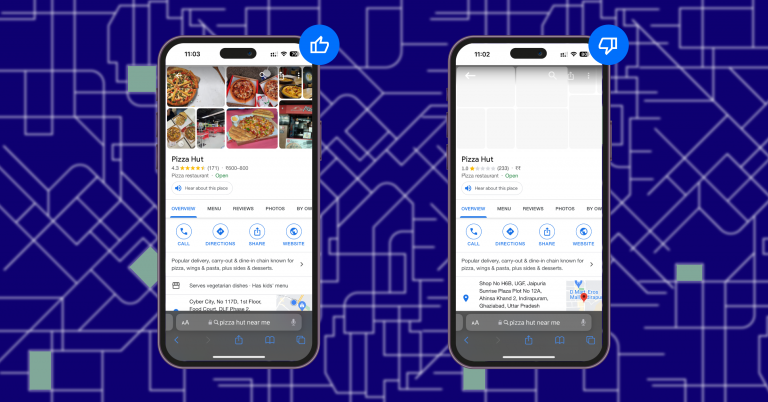In the competitive landscape of the Food & Beverage segment, one critical factor can make or break a business—its reputation. Imagine a scenario where potential consumers are deciding between two eateries: one with a stellar online reputation, raving reviews, and a strong social media presence, and the other with negative feedback and basically no online image. Which one would consumers choose?
In today’s digital age, where online reviews, social media, and word of mouth play pivotal roles in consumer decision-making, effective reputation management is not just a luxury but a necessity for restaurant owners worldwide. With the rising count of consumers digitally looking for impressive food joints and eateries, particularly in local vicinities, it just makes it that much more critical for these outlets to be on their A-game, with their digital presence and reputation.
This blog talks about comprehensive strategies that go beyond mere online reputation management. It offers actionable insights to boost the reputation of food joints and restaurants at the local and global levels, enabling the brands and owners to build trust, enhance visibility, and make data-driven decisions.
Before delving into strategies, let’s understand why restaurant reputation management is paramount. A staggering 89% (source: Think with Google)of people research restaurants online before deciding where to dine, emphasizing the influence of the digital realm on consumer decisions. Positive online reviews can result in revenue growth, showcasing the direct correlation between reputation and profitability.

Ensure to stay active on various review platforms. With Google driving most of the internet, ensuring your Google reviews are plentiful and top-notch, must be a priority. Utilize online reputation management tools such as Google Alerts and reputation management software to stay informed about your restaurant’s online perception. This strategy provides a free and efficient way to analyze performance, identify issues, and maintain a pulse on consumer sentiment.
For better online reputation management, you consider the unified interface with SingleInterface. SingleInterface provides seamless integration of online reputation management tools, making consumer engagement a lot more effective and outcome-oriented. Elevate your restaurant’s image, increase trust, and make data-driven decisions effortlessly. Remember, in the dynamic landscape in which food joints and eateries operate, staying ahead requires culinary excellence and mastering the art of reputation management.
Online review management of both positive and negative reviews is crucial for managing a restaurant’s reputation. Craft responses that show appreciation for positive feedback and demonstrate a commitment to improvement when addressing negative comments. A personalized and empathetic response can turn a dissatisfied consumer into a loyal patron and showcase your dedication to consumer satisfaction.
Create a conducive environment for in-person feedback. You can also use email marketing campaigns to encourage positive reviews. Offering incentives, such as discounts or freebies, can motivate consumers to share their experiences. Integrating consumer review prompts on social media and your website further boosts your online presence and garners valuable feedback.
Deliver outstanding consumer service, engage in community events, and build ties with local businesses. A positive offline reputation can spill over into online perceptions, contributing to a robust and favorable image in the local community. Genuine engagement with patrons and the community fosters a positive restaurant image both online and offline.
Empower your staff to understand the importance of online reputation. Provide guidelines for responding to online reviews and social media comments, encouraging professionalism and promptness. A well-trained team contributes to positive consumer experiences, ultimately impacting your restaurant’s reputation.
Invest in advanced sales forecasting software like 5-Out to optimize restaurant operations and enhance consumer experiences. Collecting internal and external data in real time, this software accurately predicts upcoming sales, ensuring optimal staffing levels and inventory management for improved consumer satisfaction.
To gauge the effectiveness of your reputation management efforts, track key performance indicators (KPIs) such as average review ratings, the number of new reviews, and social media engagement. Analyze consumer feedback trends to identify strengths and areas for improvement, using this data to inform your business decisions.
Setting clear goals, such as improving review scores or increasing positive reviews, allows you to continuously strive for improvement. Adjust your strategies based on your progress, and seek expert advice if needed. By investing in data-driven decisions and a proactive approach to reputation management, your restaurant can not only survive but thrive in the competitive global market.
Successfully managing a restaurant’s reputation goes beyond merely responding to online reviews. It involves a holistic approach, incorporating strategies for online and offline engagement. Reputation management isn’t just about addressing negative comments; it’s about creating a positive and memorable experience for every consumer, both online and offline.
By implementing these strategies, industry leaders, experts, and CEOs can foster increased trust and better visibility. They can also make informed, data-driven decisions that contribute to the sustained success of their eateries and restaurants on a global scale. In the digital age, where every review matters, reputation management isn’t just a strategy—it’s necessary for those aiming to carve a lasting mark in the competitive dining world.